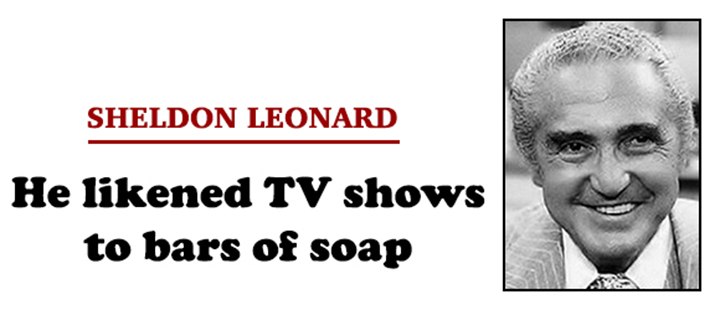| HOME |
 |
|
My interview with Sheldon Leonard, in February, 1965, was actually about "The Bill Dana Show," one of his few failures. Leonard began as an actor, then went into producing, though he continued to perform occasionally. He and Danny Thomas became a producing team and for awhile in the 1960s seemed to have cornered the market on his programs. Leonard attracted attention in the 1930s playing movie gangsters. He also was featured on radio — back in the days radio was what television would become 20 years later — and was best-known for a small bit as a race track tout that he did regularly on "The Jack Benny Show." (His spiel invariably began, "Psst! Hey, bud . . .") He may be best known now for his small role as a bartender in a key scene toward the end of "It's a Wonderful Life," perhaps our most popular Christmas movie. Leonard's manner was Runyonesque and his speech was Brooklynese. He had what you might call "a cauliflower mouth." However, people who knew Sheldon Leonard were aware he was an extremely bright, college-educated man. His friends weren't surprised when he emerged as the King Midas of television programs. His brain children included "The Dick Van Dyke Show," "The Real McCoys," "Gomer Pyle," "The Andy Griffith Show" and "I Spy." He also provided the voice for a Saturday morning cartoon character, Linus the Lionhearted. "I got into that accidentally," he told me. "Originally Linus was to be used only in an advertising campaign for the breakfast cereal, Crispy Critters. I accepted the offer to do the voice because I figured it would only take a half-hour of my time every two or three weeks. But the character caught on and now I'm doing Linus several hours each week." When we talked Leonard was still a bit unsettled by the cancellation of "The Bill Dana Show." He said he was studying the failure in the hopes it might help him answer a question that continues to frustrate the TV industry: What makes a television audience tick?" "There are aspects of the audience that we dimly understand," he said. "A partial answer to the mystery lies in the phenomenon of personal acceptance." That's what he said, all right, but to me it sounded like "de phenomenah of poysenal accepdence" because Leonard's off-screen speech, it turns out, is also Brooklynese. He firmly believed the TV audience "accepts or rejects performers largely on the basis of how those performers fit into a household. Many people thought Jose Jimenez – Bill Dana's character – was amusing, but somehow he didn't seem right in the living room." In other words, Dana's show might have failed because the character he played was a member of a minority group. "We never identified him as Mexican, Puerto Rican or Spanish, but apparently there was something about him that made people uncomfortable." I suggested the real reason might be that Jose Jimenez simply wasn't funny. Leonard didn't agree, of course. He insisted the failure had something to do with how Jimenez fit into the viewers homes. Which led him to to veer off in a slightly different direction with this observation: "You'll notice most successful shows take place in a home. People watch television in their living room and seem unwilling to be transported anywhere but to another living room. He said this living room-to-living room connection established close relationships between members of the TV audience and TV performers, even though the two groups never meet. Leonard said television stars are not held in frightened awe as are movie and stage stars. "I was in Miami with Dick Van Dyke last year when he was spotted by some fans. They march over and talked to him like he was an old friend. They asked him to pose for pictures and I'm sure they would have been made if he hadn't done so. "If Dick were a movie star – like Cary Grant, maybe – I'm sure most people would simply gawk at him from a distance. But a TV personality is someone you've had in our living room. Someone, if you will, you've had a beer with." He said performers who affect the tee shirt, old slacks and loafers cordiality have a greater chance of succeeding. "I was Judy Canova's leading man on radio ["The Judy Canova Show"] for many years," said Leonard, "and the quality that made her a success was ... uh, folksiness. And, please, if I'm quoted out of context I'll sound like an idiot. I just can't think of a better word. "The 'Van Dyke Show,' 'Andy Griffith' and 'Donna Reed' have this quality. So does 'Bonanza.' It has the folksiest cowboys in the world." Leonard added that he hoped someday to know the TV audience so well he will be able to package new programs with almost complete assurance they will succeed. Everyone in the television industry would like this knowledge, but Leonard seemed alone in the faith such knowledge can be obtained. Toward this end he and his partner, Danny Thomas, established two fellowships at Syracuse University (Leonard's alma mater) for the study of the television audience. "After all," he said, "companies such as Procter and Gamble have been able to determine what people will buy. They know, for example, that soap wrapped in pink will outsell soap wrapped in blue. "I think TV producers should be able to apply the same principles in selling shows." Sheldon Leonard died in 1997, at age 90. I can't help but wonder how he would use various internet tools to communicate with potential viewers as he studied "de phenomenah of poysenal accepdence" while creating a television series. In the meantime, however, the mystery of the fickle television audience remains unsolved. |
 |
| HOME • STARSTRUCK • CONTACT |
